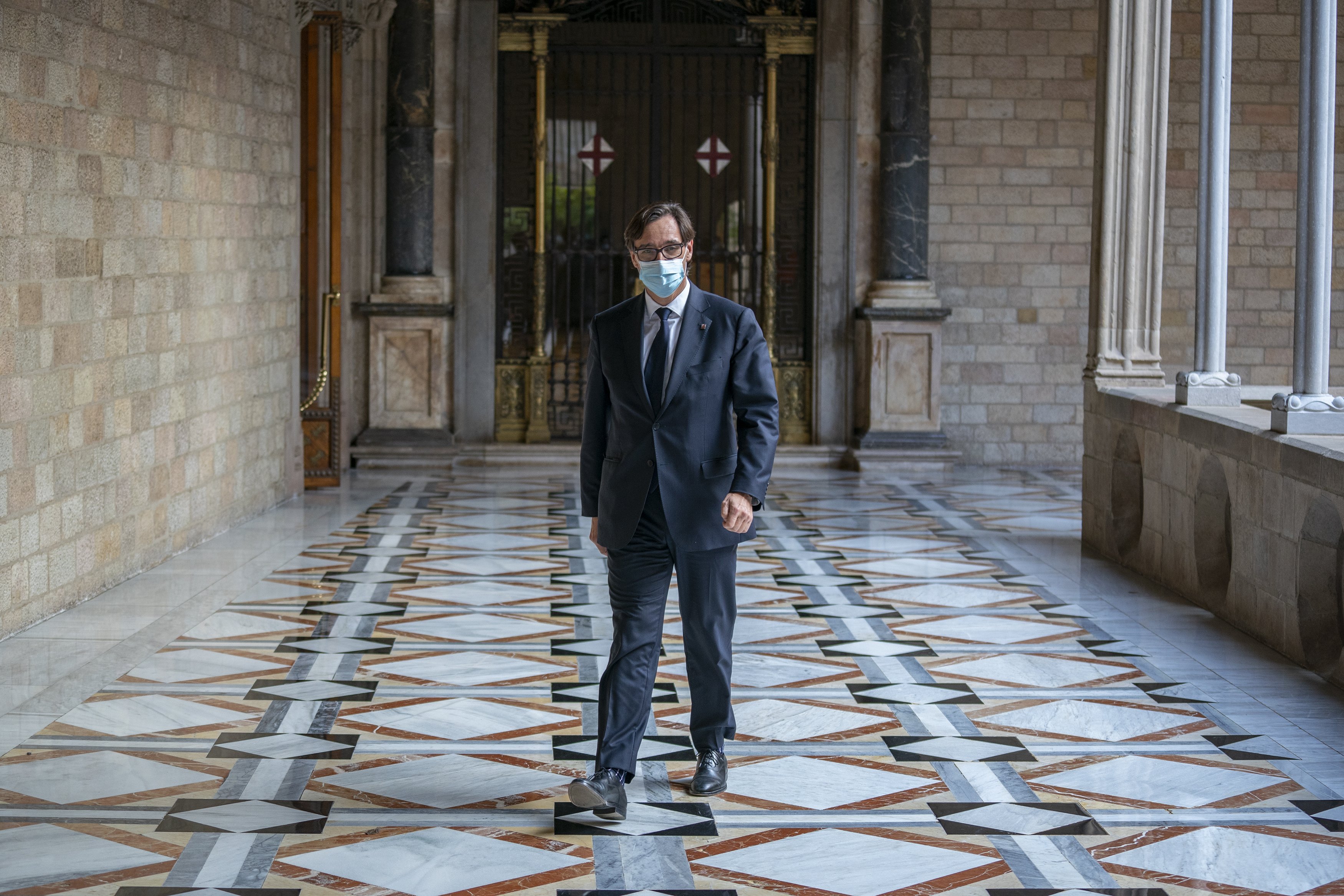The PSC would once again finish as the largest party if elections to the Parliament of Catalonia were now held and the independence movement, currently in government, would lose ground and perhaps even lose the absolute majority it won in the last elections, held on 14th February, 2021. This is the snapshot of the Catalan political scene offered by a Feedback poll for El Nacional, published to coincide with the first anniversary of the swearing in of ERC's Pere Aragonès as president of the Generalitat. According to the poll, the Catalan Socialists (PSC), led by Salvador Illa, would improve on its results from the previous elections. On the other hand, the Republican Left (ERC) and their governing partners Together for Catalonia (Junts) have not earned an electoral dividend from the first 12 months of the current coalition government. ERC stays in the same position and Junts are forecast to suffer a major setback in the midst of the leadership debate following the resignation of Carles Puigdemont from the party presidency. The Popular Unity Candidature (CUP) does not improve much either.
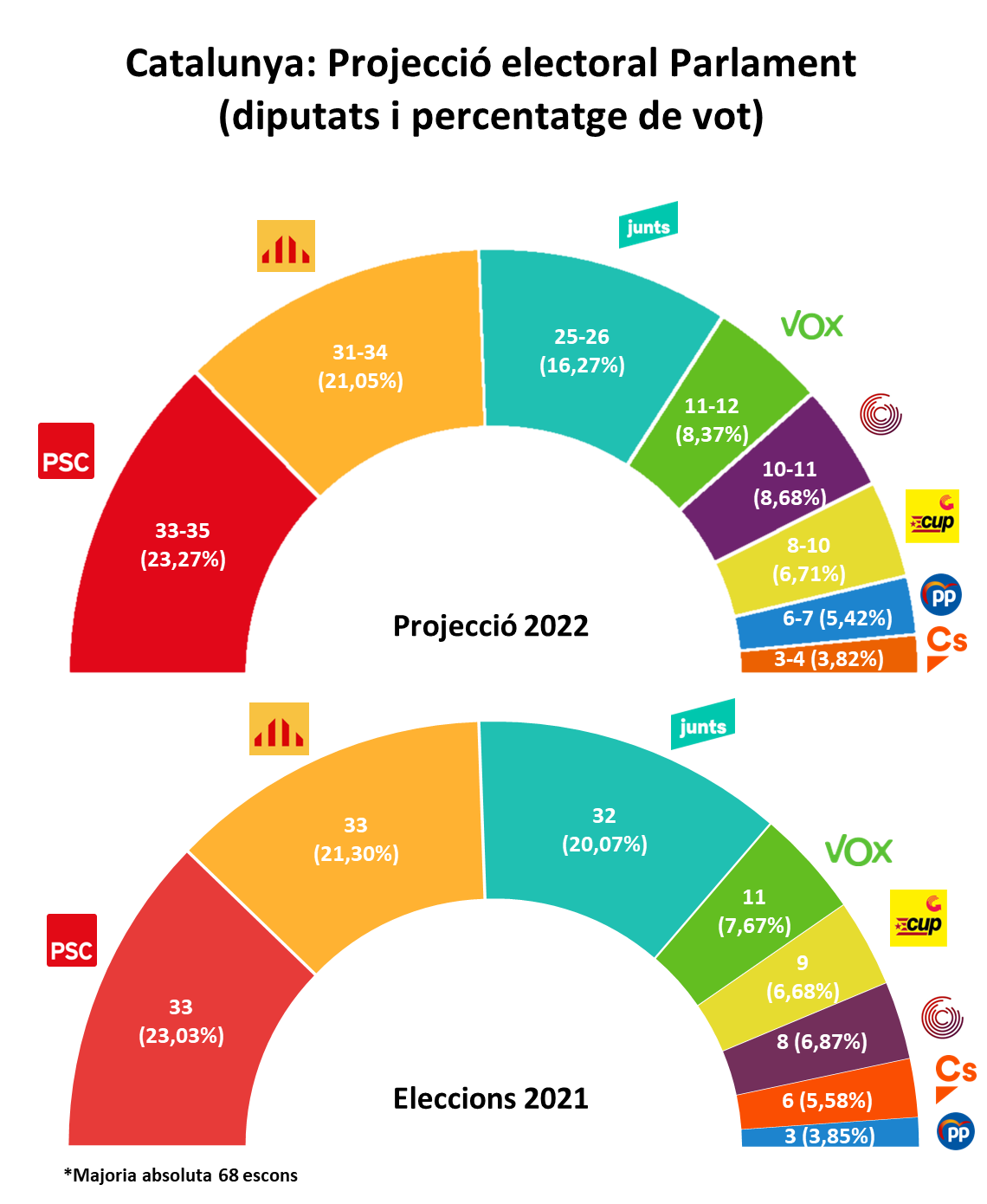
The parliamentary election poll is based on a sample of 1,000 telephone interviews conducted between May 10th and 19th and has a margin of error of 3.16%. The allocation of seats and percentage of votes was made with a forecast turnout of 59.33%, that is, 8.04 points above that of the previous elections, held in the midst of the pandemic, in which only 51.29% of registered voters went to the polls. The figure for undecided voters is 39.9%.
The PSC would win the election again with 23.27% of the vote (23.03% in the 2021 election) and an expected 33 to 35 seats - that is, at least as many as it has now, or two more in the best scenario. ERC would maintain its second position with a downward trend: 21.05% of the vote (21.30% in 2021) and between 31 and 34 deputies (it now has 33). Junts would be the big loser in seats, expected to take 16.27% of the vote (20.07% in 2021) and 25-26 deputies in Parliament, which is 6 or 7 fewer than those obtained in 2021, when the party won its current electoral strength of 32 MPs. Thus, the ERC would clearly prevail in the eternal battle between the two main pro-independence forces.
The far-right Vox party would maintain its fourth place in the chamber of Barcelona's Parc de la Ciutadella, with an upward trend: 8.37% of the vote (7.67% in 2021) and 11-12 deputies (now, 11). The left-wing pro-independence CUP would make a small amount of progress in its percentage of votes, with 6.71% (6.68% in the last elections) and 8-10 deputies (now it has 9). En Comú Podem, the alternative left party led by Jéssica Albiach, would significantly increase its presence in Parliament. It would be the fourth strongest in percentage of votes, with 8.68% (up from 6.87% in 2021) and would get 10-11 seats, 2 to 3 more than its current figure of 8. Ciudadanos (Cs), which won the Article 155 election called by Mariano Rajoy in 2017, would continue to hemorrhage electorally, with 3.82% of the vote and 3-4 deputies (5.58% and 6 deputies in 2021). On the other hand, the expectations of the right-wing Spanish People's Party (PP) are improving, as they recover notably with 5.42% and 6-7 deputies (3.85% and 3 deputies in 2021). The pro-independence PDeCAT, which would win 1.84% of the vote (2.72% in the previous elections), would miss out on representation for the second election in a row.
Results across Catalonia
Broken down by Catalonia's four electoral demarcations, the PSC would maintain its first position in the province of Barcelona, with 22-23 seats (23 in the previous elections), ERC would be second force with 18-19 (now, 19) and Junts third, with 13-14 (16 currently). In Tarragona, ERC would repeat at the top of the ranking with 5 seats (as now), followed by the PSC, which would tie with 5 (currently 4) and Junts, with 3 (now 4). In Girona, Junts would continue to be the force with the most votes and seats (5) but would lose 2 (down from 7 in 2021), ERC would be the second force with 4-5 seats (4 currently) and the PSC third, with 3-4 (3) in 2021). The change of hegemony would take place in Lleida, where ERC, with a prediction of 4-5 seats (5 in 2021) would overtake Junts, which would be the second force with 4 (5 in 2021); the Socialists, with 3 seats, would remain as the third force.
Below: El Nacional Poll May 2022: Predicted results of a hypothetical Catalan election (seats and vote %, compared with 2021 results) for Barcelona, Tarragona, Lleida and Girona constituencies.
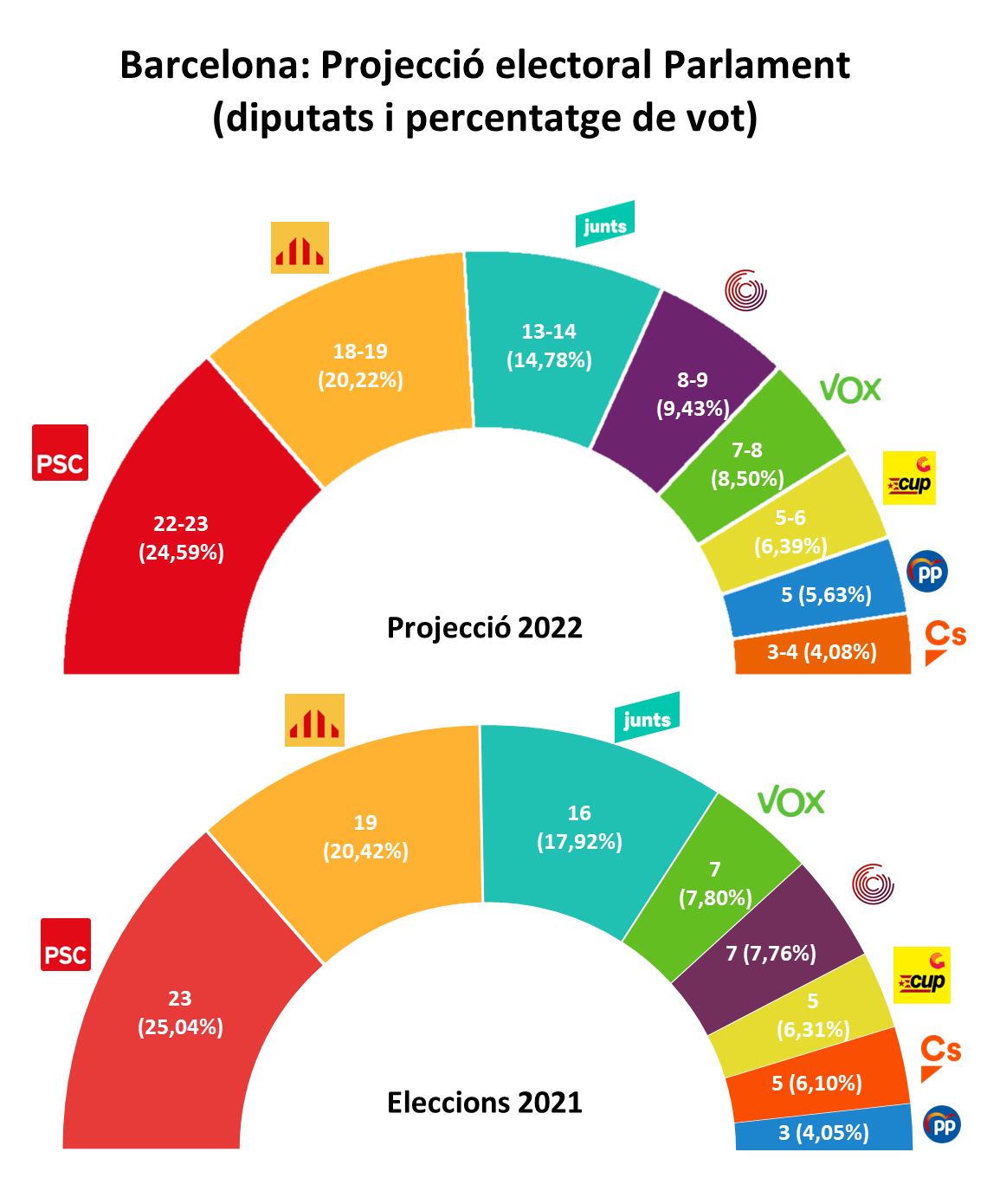
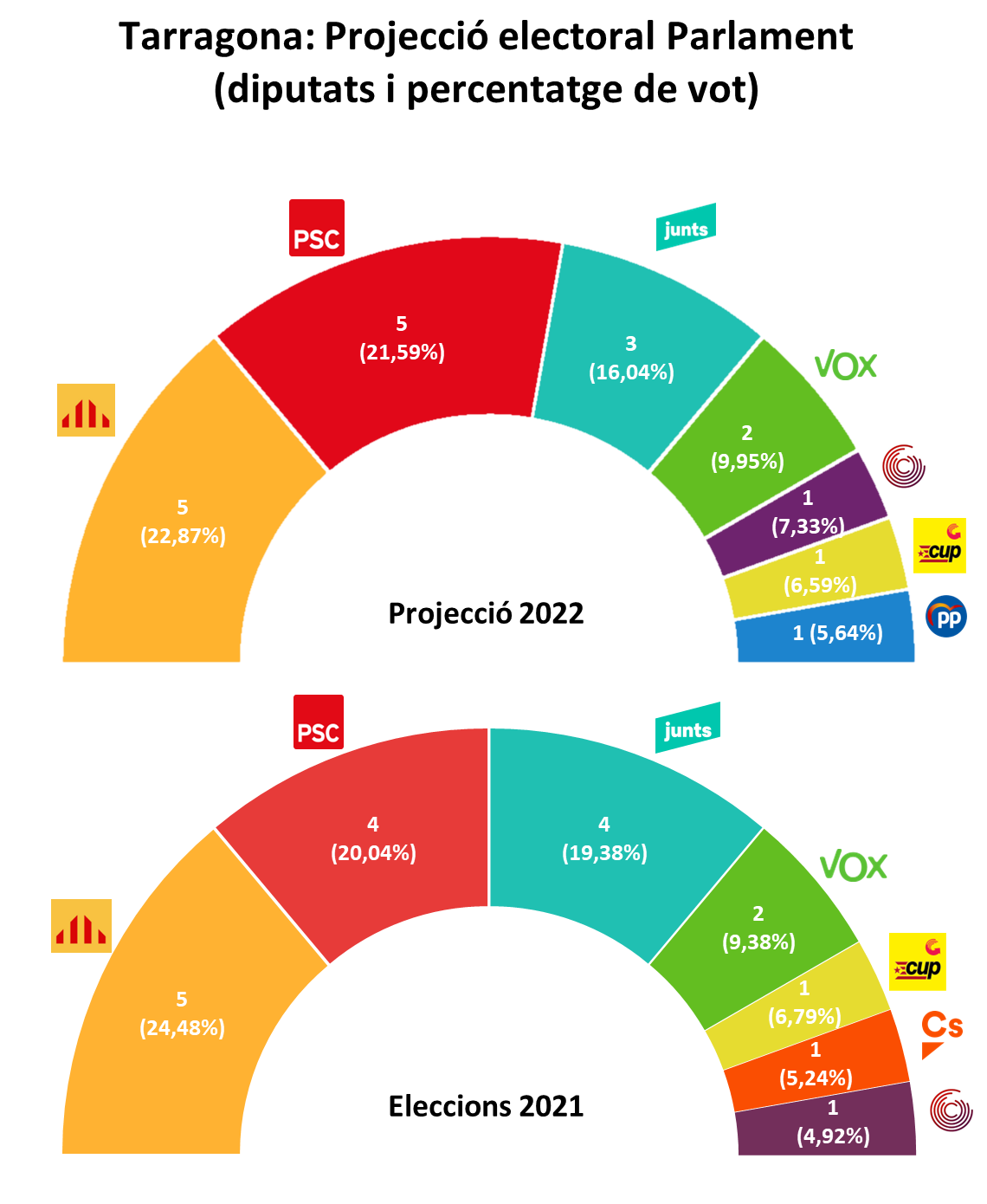
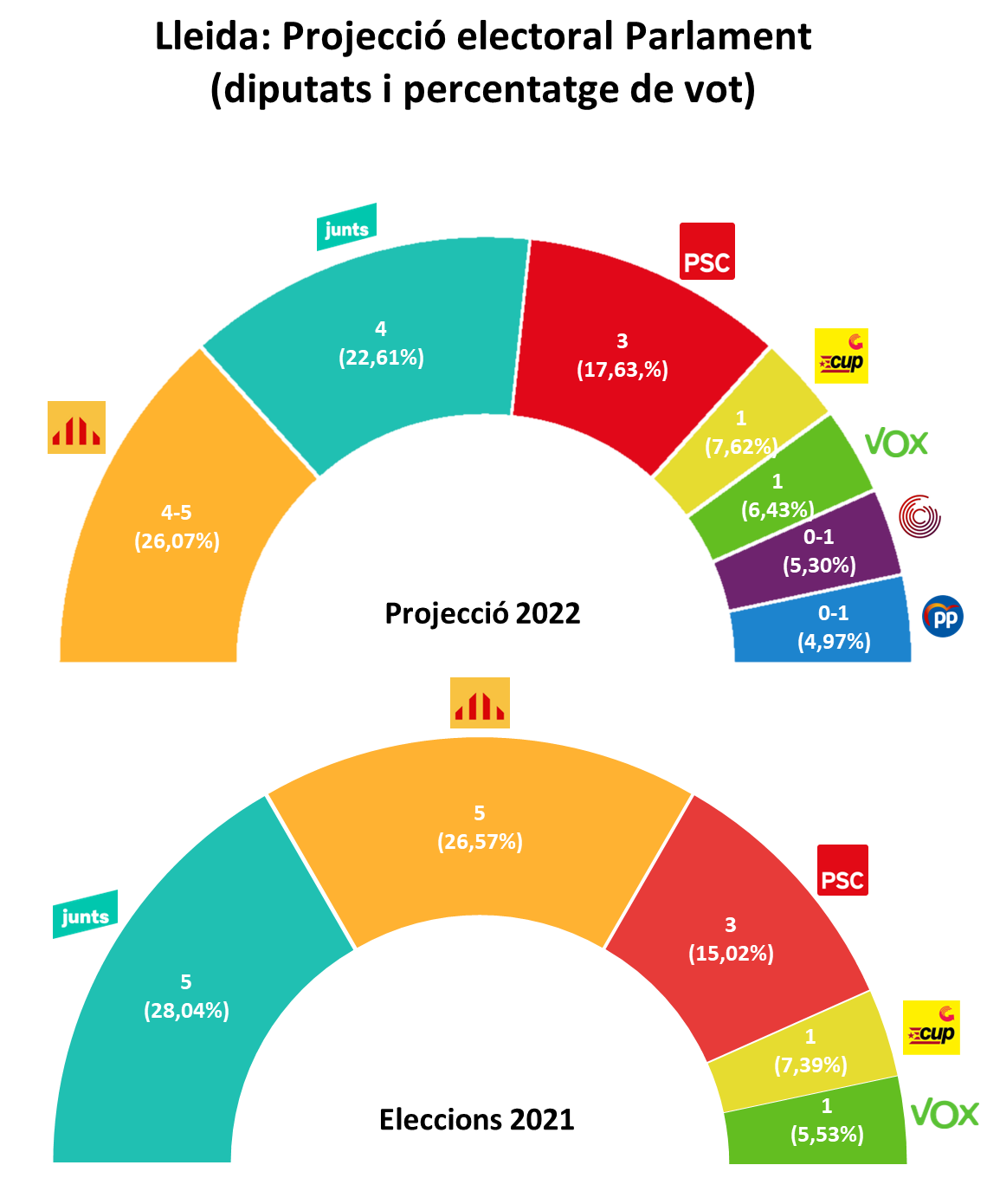
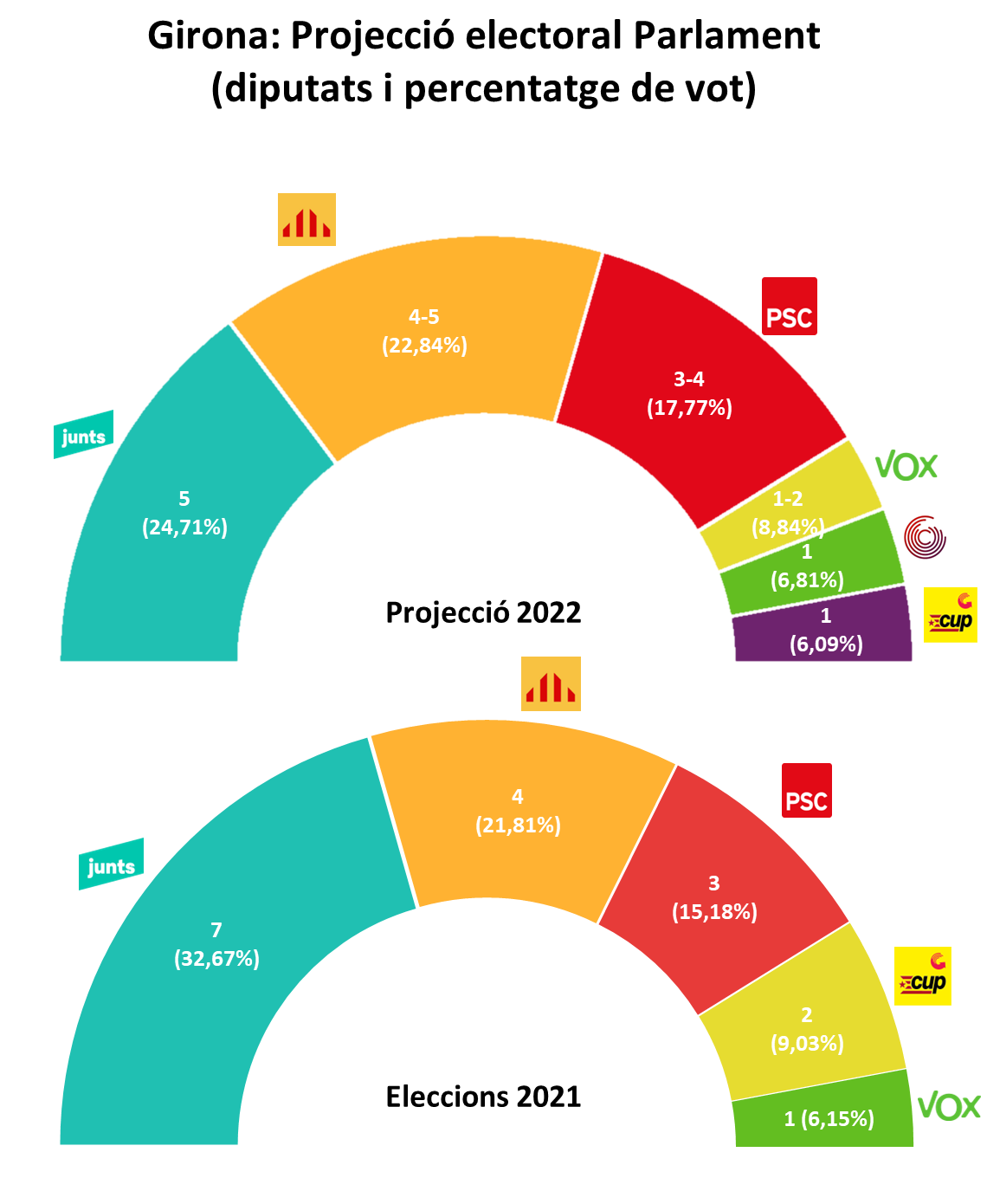
Change of majorities?
The investiture of the new Catalan president and the formation of the current government, which concluded just on a year ago, cost Pere Aragonès three months of negotiations, first with the CUP and then with Junts, with three votes being required before Parliament gave its approval: with this new poll, a repeat of that same majority would be more difficult. ERC and PSC would be in keen dispute for the ability to form parliamentary and governmental majorities. The pro-independence bloc (ERC, Junts and the CUP), which in 2021 had a very good working majority of 74 deputies in Parliament - the total sum of the pro-independence electoral space obtained the legendary mark of 52% of the vote - would now oscillate between 64-70 deputies. That is, it could maintain an absolute majority (68) or even surpass it, in the best scenario, but it could also lose it. In such a case, the three pro-independence parties would need a fourth force to reach the government.
But neither would the PSC find it easy to prevail in the post-election alliance game. Arithmetically, Socialist leader Salvador Illa could form a left-wing tripartite with ERC and the Comuns which, according to the Feedback poll, would have a huge majority: between 74 and 80 seats. But that would mean the ERC giving up ideas of holding the presidency. the alternative for Illa would be to put himself at the mercy of an anti-independence pact, with the Socialists needing the support of not only the Spanish right but also the far right, while at the same time reaching out to the Comuns on the left.
Less independentism
The option of Catalan independence as a future political model for Catalonia is the choise with most support in the Feedback poll. But unlike other polls conducted in the heyday of the independence process, support for independence is now 32.1%. In second place is the federalist option, with Catalonia as a state within a federal Spain, which is preferred by 21.7% of poll participants. Then there are 19% who opt for an autonomous community but with more power than at present. On the other hand, 16.7% opt for an autonomy like the current one, 3.2% for a Spanish region with less autonomy and 7.2% are not sure. Nevertheless, a large majority of Catalans, 72.8%, want to a greater level of self-government - more powers, federalization or independence - but there is division in the details on how they want to achieve this.
Technical details:
- Area: Catalonia..
- Population: People aged 18 years and over with the right to vote in the elections to the Catalan Parliament.
- Method: Telephone survey with combination of landlines (75%) and cellphones (25%).
- Sample: 1,000 interviews.
- Quotas: Proportional on 3 variables: (1) age group,(2) sex and (3) type of city based on memory of vote.
- Statistical conditions: Total possible margin of error +3,16%, for an infinite population (electoral role of 5,624,067 people), with a confidence level of 95.5% (K=2), and the assumption of maximum indeterminacy where p=q=50/50.
- Field work: Survey interviews conducted between Tuesday 10th and Thursday 19th May 2022.
- Survey company: Feedback

